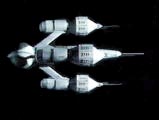|
By W. Everett Chesnut
The British SF series "Blake's 7" and the American SF
series "Andromeda" are astonishingly similar,
regardless of whether the similarities come from
imitation or common use of the same archetypes. What
fascinates me is the ways in which they are different.
I find the differences between the two shows in
many ways epitomize the differences between the two
nations of origin in their depiction of a romantic
genre such as SF.
Roj Blake maps over to Dylan Hunt as the driving
ethical force. Avon's ruthless intellect maps over to
Tyr's ruthless muscularity (how very American!).
Vila's cowardice and greed maps over to Harper's
lucklessness and greed. Etc.
The British awareness of the double-edge of idealism
is present in Blake, but Hunt's idealism has far more
of the American romanticism. In *Andromeda*, Hunt has
a luckiness which always justifies him even if by deus
ex machine, unlike Blake, who has been proven to be
wrong or blinded by his idealism on several occasions
with no sudden revelations to vindicate him.
The British Avon expresses his hard-ass pragmatism by
being severely intellectual and caustically witty.
The American Tyr expresses his hard-ass pragmatism by
being animalistic and muscular and by uttering cynical
(not witty) proverbs. How very British, how very
American.
The British image of the loveable thief is the
bumbling ugly-cute Vila, but the American image of the
same is the hustler-not-thief Harper, who is puppydog
adorable in a way very different from Vila's hangdog
charm.
In the British *Blake's 7*, the ship's A.I. is
humanized most of all by its human sense of wit and
irony. In contrast, in the American *Andromeda*, the
ship's A.I. is humanized by having a sexually
attractive body.
Such similarities are often less noticeable to
American eyes because of the culturally different
iterations: the "Andromeda" is so very American
whereas "Blake's 7" is so clearly British.
|





